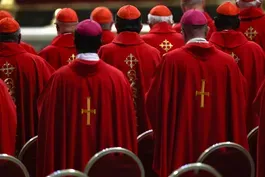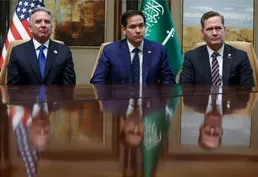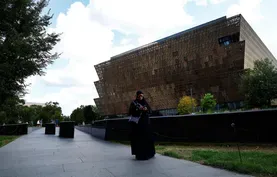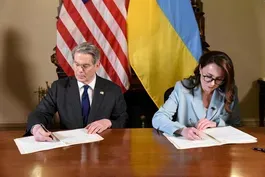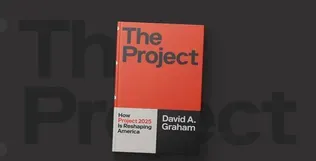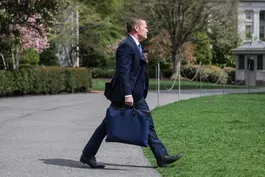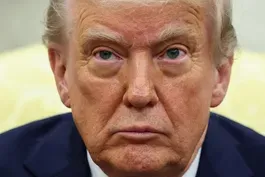
Christopher Rufo on his push to scrutinize higher education
Clip: 5/1/2025 | 9m 12sVideo has Closed Captions
Conservative activist Christopher Rufo on his push to scrutinize higher education
President Trump is pushing for more control at dozens of colleges and universities, he says to promote free speech, end “wokeism” and clamp down on antisemitism. But many schools are opposing the efforts. Conservative activist Christopher Rufo has been instrumental in triggering the wider response and big changes from the administration. Amna Nawaz spoke with him for our series, On Democracy.
Problems with Closed Captions? Closed Captioning Feedback
Problems with Closed Captions? Closed Captioning Feedback
Major corporate funding for the PBS News Hour is provided by BDO, BNSF, Consumer Cellular, American Cruise Lines, and Raymond James. Funding for the PBS NewsHour Weekend is provided by...

Christopher Rufo on his push to scrutinize higher education
Clip: 5/1/2025 | 9m 12sVideo has Closed Captions
President Trump is pushing for more control at dozens of colleges and universities, he says to promote free speech, end “wokeism” and clamp down on antisemitism. But many schools are opposing the efforts. Conservative activist Christopher Rufo has been instrumental in triggering the wider response and big changes from the administration. Amna Nawaz spoke with him for our series, On Democracy.
Problems with Closed Captions? Closed Captioning Feedback
How to Watch PBS News Hour
PBS News Hour is available to stream on pbs.org and the free PBS App, available on iPhone, Apple TV, Android TV, Android smartphones, Amazon Fire TV, Amazon Fire Tablet, Roku, Samsung Smart TV, and Vizio.
Providing Support for PBS.org
Learn Moreabout PBS online sponsorshipAMNA NAWAZ: Now to our series On Democracy, where we hear a range of perspectives on how government should function, what's led to this moment in American history, and where the country might be headed next.
Tonight, we're looking at the president's push for more control at dozens of colleges and universities in order, he says, to promote free speech, end wokism and clamp down on burgeoning antisemitism.
But many schools are opposing the administration and argue that Trump is trying to dictate what's acceptable speech and what colleges can do.
We're joined by a leading conservative activist who's been instrumental in triggering the wider response and big changes from the administration.
Christopher Rufo is a senior fellow at the Manhattan Institute.
Chris, welcome to the "News Hour."
Thanks for joining us.
CHRISTOPHER RUFO, Manhattan Institute: Thank you.
AMNA NAWAZ: So a lot of the action we have seen from President Trump in his second term so far builds on a lot of the ideas we have heard from a number of conservative activists, but you in particular, and I know you have called for a number of reforms, but you have also said the first field of battle is higher education.
So explain to us why that is and also why the focus on elite universities as well.
CHRISTOPHER RUFO: Well, you want to focus on elite universities because elite universities establish the cultural signals that then flow downward to the university sector as a whole.
And what we know from Ivy League universities, including Harvard, Princeton and Columbia, is that they are directly, flagrantly and intentionally violating the Civil Rights Act of 1964.
They're promoting from their central administrations racial discrimination, scapegoating and even segregation.
AMNA NAWAZ: So the changes we know the Trump administration has been trying to push through are really being enforced by threatening to cut federal funds, right?
That is sort of the threat that's looming over these universities.
A lot of universities, who I should note dispute the allegations you laid out in your first answer, though, a lot of universities will say, we can talk about this.
There are processes and laws in place to make these changes.
This is not how you do it.
Why do you think this is the best way to force that change?
CHRISTOPHER RUFO: Well, it's exactly how you do it.
And,of course, we know this from legal cases.
We know this from my investigative reporting.
And we know this even yesterday from Harvard's own report on antisemitism at Harvard.
And so this is actually the moderate option.
If you go back in history, President Eisenhower enforced the civil rights law at the time by sending federal troops into Little Rock High School.
President Kennedy did the same thing, sending troops to desegregate University of Mississippi.
So the president's threat under his Article II powers as president is not only legitimate, but I think it's really moderate, given the context of what's happening.
AMNA NAWAZ: I should note that the efforts you're citing there were to end segregation.
Those were to address a lot of the legacy of racist policies in America's history, and also that Harvard University, as you note, has put out a report.
They said there's work to do on both antisemitism and Islamophobia, addressing both on campus.
But they also maintain that the government does not have the right to subvert their independence.
And a number of other universities argue the same thing.
What do you say to that?
CHRISTOPHER RUFO: Well, I mean, of course, that's not true at all.
I'm a fellow at Hillsdale College.
Hillsdale College takes no federal money because Hillsdale knows that when you start taking taxpayer dollars, there are corresponding and reciprocal obligations and duties.
And so Harvard has a duty to uphold the law.
Certainly, we have made massive progress since the civil rights era, but the last bastion of racial segregation is ironically enough at these elite Ivy League universities, which retain segregated programs, segregated graduation ceremonies, segregated scholarship opportunities in many cases.
And so that's really what we're fighting against.
And I think we're going to win.
Harvard actually announced yesterday they were going to stop racially segregated graduation ceremonies.
It's a good start, but much more is needed.
AMNA NAWAZ: I know you're using the term segregation here.
I think it's important to point out too people would participate in those by their own choice.
This was not a segregation that was imposed from the university coming down.
But I guess the big question here is, what is the big change you want to see at the universities?
I know you're alleging that they're breaking laws.
They dispute that.
If that's not going to be pursued through the courts, what's the big change you want to see at the university system?
CHRISTOPHER RUFO: Well, I think you're wrong on the facts.
When you have racially segregated or racially separate affinity groups, and you have affinity groups that are for members of particular races with support from the administration, I think you're just wrong on the facts.
But here's the big change.
AMNA NAWAZ: Well, Chris, if I may, those are groups that people joined by choice.
They are not forced to join those.
(CROSSTALK) CHRISTOPHER RUFO: Harvard has adopted a principle.
Sure, but you could have labeled water fountains and say, we're not going to punish you if you go to the wrong race, categorized water fountain.
It's your choice, but it's still wrong.
It's still a violation of Title VI of the Civil Rights Act.
But the big question here is a big question for America.
Do we want to have rule by racial equity or do we want to have rule by colorblind equality?
Under racial equity that is currently practiced at places like Harvard, you are rewarded and punished in part because of your ancestry.
Under what I'm proposing, a regime of racial equality and in a colorblind manner, you would be judged solely on your own talents, merits, and achievements.
AMNA NAWAZ: So, as you have probably seen, hundreds of college presidents and universities signed the letter protesting what they argue is unprecedented government overreach here.
And this is what they said in their letter.
They said that they have a "commitment to serve as centers of open inquiry, where in the pursuit of truth, faculty, students, and staff are free to exchange ideas and opinions across a full range of viewpoints without fear of attribution, censorship, or deportation."
I know that you have argued a lot of your efforts are about defending free speech.
What they're saying here is these actions actually limit free speech.
What do you say to that?
CHRISTOPHER RUFO: Well, you have to actually interrogate the factual premise of that statement.
Are these places bastions of open inquiry and free speech?
And the answer is obviously no.
Less than 1 percent of Harvard faculty now are conservative because they have been ruthlessly through DEI policies and other ideological preferences weeded out of the university departments.
And so the idea that these places are bastions of free speech and open inquiry is not supported by the facts.
AMNA NAWAZ: But, Chris, if I may, how do the actions and what we have seen from this administration so far, how do they defend free speech?
I mean, we have seen the border czar basically come out and say that there are limitations on free speech when he was talking about the reasons for deporting some of the pro-Palestinian protesters.
You saw the president come out with an executive order that actually restricted how teachers and faculty and staff in K-12 schools can talk about things like race and gender.
Those are all limits on free speech.
CHRISTOPHER RUFO: I don't think that's right.
I think you should take a look at the president's executive order.
I'm not aware of the comments by the homeland security director, but what I can say is that there is a playbook that we have developed in states around the country, including the state of Florida.
We have expanded the range of discourse in higher education.
At New College of Florida, for example, where I'm a trustee, we have probably the widest range of discourse of any public university in the United States.
We have a faculty that approaches issues from a wide variety of perspectives, all within the classical liberal arts tradition.
These are not restrictions on speech.
These are basic protections of our civil rights, civil discourse and civil liberties.
AMNA NAWAZ: You have talked about the fact that you agree there is a legacy in America to our history of anti-Black enslavement and Jim Crow policies and so on.
So I'm curious.
If you take away the label of DEI, in what ways do you think that legacy should be addressed?
Through what systems and what processes?
CHRISTOPHER RUFO: Well, the problem with DEI was really encapsulated... AMNA NAWAZ: Yes, take DEI off the table for a second.
CHRISTOPHER RUFO: ... best by "critical Race" through Ibram Kendi.
Yes, but it's this idea that the solution to racist discrimination in the past is so-called anti-racist discrimination in the future.
And so any kind of literate kindergartner would be able to say, hey, wait a minute, two wrongs don't make a right.
Discrimination against one group in the past does not mean that discrimination against another group in the future is the right course of action.
I think what we want to do is to say we want to have a principle of colorblind equality in which every American is judged as an individual and that people can use their talents and gifts to pursue happiness in whatever way they see fit and then to really encourage everyone to participate in the system that we have with equal treatment under the law.
I think that is a very popular idea.
I think it's the right idea.
And I think that's really the only way to move forward in what we have, which is a complex and multiracial society.
AMNA NAWAZ: Chris Rufo, senior fellow at the Manhattan Institute.
Chris, thank you very much for your time.
CHRISTOPHER RUFO: Thank you.
'Conclave' author on the tradition of selecting a new pope
Video has Closed Captions
Clip: 5/1/2025 | 6m 24s | 'Conclave' author Robert Harris on the secretive tradition of selecting a new pope (6m 24s)
Ex-ambassador on changes to Trump's national security team
Video has Closed Captions
Clip: 5/1/2025 | 6m 11s | Former ambassador John Negroponte discusses changes to Trump's national security team (6m 11s)
Exploring the efforts to control how U.S. history is told
Video has Closed Captions
Clip: 5/1/2025 | 7m 28s | Exploring the efforts to control how U.S. history is presented in museums and monuments (7m 28s)
News Wrap: U.S. and Ukraine sign minerals deal
Video has Closed Captions
Clip: 5/1/2025 | 6m 36s | News Wrap: U.S. and Ukraine sign minerals deal (6m 36s)
'The Project' explores Project 2025's origins and goals
Video has Closed Captions
Clip: 5/1/2025 | 7m 5s | 'The Project' explores Project 2025's origins and goals to reshape American culture (7m 5s)
Trump ousts Waltz in national security team shakeup
Video has Closed Captions
Clip: 5/1/2025 | 4m 36s | Waltz ousted as national security adviser, nominated for UN role in White House shakeup (4m 36s)
White House not backing down from clash with judiciary
Video has Closed Captions
Clip: 5/1/2025 | 3m 22s | Trump administration not backing down from clash with judiciary (3m 22s)
Providing Support for PBS.org
Learn Moreabout PBS online sponsorshipSupport for PBS provided by:
Major corporate funding for the PBS News Hour is provided by BDO, BNSF, Consumer Cellular, American Cruise Lines, and Raymond James. Funding for the PBS NewsHour Weekend is provided by...
